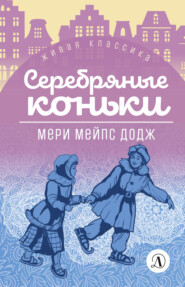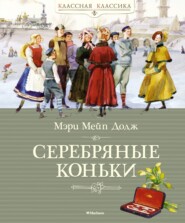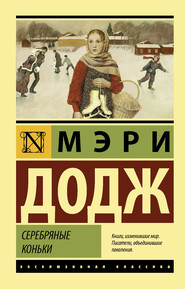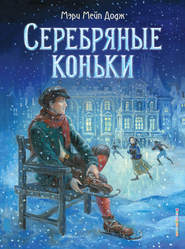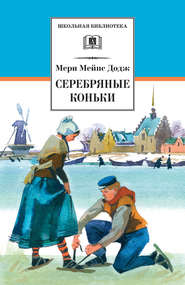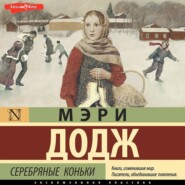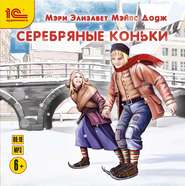По всем вопросам обращайтесь на: info@litportal.ru
(©) 2003-2025.
✖
Hans Brinker, or the Silver Skates / Серебряные коньки. Книга для чтения на английском языке
Настройки чтения
Размер шрифта
Высота строк
Поля
“All right,” said the captain.
“If we had time, Benjamin,” said Lambert van Mounen in English, “I should like to take you to the City Hall, or Stadhuis. There are building piles for you! It is built on nearly fourteen thousand of them, driven seventy feet into the ground. But what I wish you to see there is the big picture of Van Speyk blowing up his ship – great picture.”
“Van WHO?” asked Ben.
“Van Speyk. Don’t you remember? He was in the height of an engagement with the Belgians, and when he found that they had the better of him
and would capture his ship, he blew it up, and himself, too, rather than yield to the enemy.”
“Wasn’t that Van Tromp?”
“Oh, no. Van Tromp was another brave fellow. They’ve a monument to him down at Delftshaven – the place where the Pilgrims took ship for America.”
“Well, what about Van Tromp? He was a great Dutch admiral, wasn’t he?”
“Yes, he was in more than thirty sea fights. He beat the Spanish fleet and an English one, and then fastened a broom to his masthead to show that he had swept the English from the sea. Takes the Dutch to beat[107 - Takes the Dutch to beat – (разг.) Голландцев не победишь], my boy!”
“Hold up!” cried Ben. “Broom or no broom, the English conquered him at last. I remember all about it now. He was killed somewhere on the Dutch coast in an engagement in which the English fleet was victorious. Too bad,” he added maliciously, “wasn’t it?”
“Ahem! Where are we?” exclaimed Lambert, changing the subject. “Halloo! The others are way ahead of us – all but Jacob. Whew! How fat he is! He’ll break down before we’re halfway.”
Ben, of course, enjoyed skating beside Lambert, who, though a staunch Hollander, had been educated near London and could speak English as fluently as Dutch, but he was not sorry when Captain van Holp called out, “Skates off! There’s the museum!”
It was open, and there was no charge on that day for admission. In they went, shufling, as boys will when they have a chance, just to hear the sound of their shoes on the polished floor.
This museum is in fact a picture gallery where some of the finest works of the Dutch masters are to be seen, besides nearly two hundred portfolios of rare engravings.
Ben noticed, at once, that some of the pictures were hung on panels fastened to the wall with hinges. These could be swung forward like a window shutter, thus enabling the subject to be seen in the best light. The plan served them well in viewing a small group by Gerard Douw[108 - Gerard Douw – Герард Доу (1613–1675), голландский художник], called the “Evening School,” enabling them to observe its exquisite finish and the wonderful way in which the picture seemed to be lit through its own windows. Peter pointed out the beauties of another picture by Douw, called “The Hermit,” and he also told them some interesting anecdotes of the artist, who was born at Leyden in 1613.
“Three days painting a broom handle!” echoed Carl in astonishment, while the captain was giving some instances of Douw’s extreme slowness of execution.
“Yes, sir, three days. And it is said that he spent five in finishing one hand in a lady’s portrait. You see how very bright and minute everything is in this picture. His unfinished works were kept carefully covered and his painting materials were put away in airtight boxes as soon as he had finished using them for the day. According to all accounts, the studio itself must have been as close as a bandbox. The artist always entered it on tiptoe, besides sitting still, before he commenced work, until the slight dust caused by his entrance had settled. I have read somewhere that his paintings are improved by being viewed through a magnifying glass. He strained his eyes so badly with the extra finishing, that he was forced to wear spectacles before he was thirty. At forty he could scarcely see to paint, and he couldn’t find a pair of glasses anywhere that would help his sight. At last, a poor old German woman asked him to try hers. They suited him exactly, and enabled him to go on painting as well as ever.”
“Humph!” exclaimed Ludwig indignantly. “That was high![109 - That was high! – (разг.) Ничего себе! Хорошенькое дело!] What did SHE do without them, I wonder?”
“Oh,” said Peter, laughing, “likely she had another pair. At any rate she insisted upon his taking them. He was so grateful that he painted a picture of the spectacles for her, case and all, and she sold it to a burgomaster for a yearly allowance that made her comfortable for the rest of her days.”
“Boys!” called Lambert in a loud whisper, “come look at this ‘Bear Hunt.’”
It was a fine painting by Paul Potter[110 - Paul Potter – Пауль Поттер (1625–1654), голландский живописец], a Dutch artist of the seventeenth century, who produced excellent works before he was sixteen years old. The boys admired it because the subject pleased them. They passed carelessly by the masterpieces of Rembrandt and Van der Helst, and went into raptures over an ugly picture by Van der Venne, representing a sea fight between the Dutch and English. They also stood spellbound before a painting of two little urchins, one of whom was taking soup and the other eating an egg. The principal merit in this work was that the young egg-eater had kindly slobbered his face with the yolk for their entertainment.
An excellent representation of the “Feast of Saint Nicholas” next had the honor of attracting them.
“Look, Van Mounen,” said Ben to Lambert. “Could anything be better than this youngster’s face? He looks as if he KNOWS he deserves a whipping, but hopes Saint Nicholas may not have found him out. That’s the kind of painting I like; something that tells a story.”
“Come, boys!” cried the captain. “Ten o’clock, time we were off!”
They hastened to the canal.
“Skates on! Are you ready? One, two – halloo! Where’s Poot?”
Sure enough, where WAS Poot?
A square opening had just been cut in the ice not ten yards off. Peter observed it and, without a word, skated rapidly toward it.
All the others followed, of course.
Peter looked in. They all looked in; then stared anxiously at each other.
“Poot!” screamed Peter, peering into the hole again. All was still. The black water gave no sign; it was already glazing on top.
Van Mounen turned mysteriously to Ben. “DIDN’t HE HAVE A FIT ONCE?”
“My goodness! yes!” answered Ben in a great fright.
“Then, depend upon it, he’s been taken with one[111 - he’s been taken with one – (зд.) он потерял сознание] in the museum!”
The boys caught his meaning. Every skate was off in a twinkling[112 - in a twinkling – (разг.) мгновенно; в мгновение ока]. Peter had the presence of mind to scoop up a capful of water from the hole, and off they scampered to the rescue.
Alas! They did indeed find poor Jacob in a fit, but it was a fit of sleepiness. There he lay in a recess of the gallery, snoring like a trooper! The chorus of laughter that followed this discovery brought an angry official to the spot.
“What now! None of this racket! Here, you beer barrel, wake up!” And Master Jacob received a very unceremonious shaking.
As soon as Peter saw that Jacob’s condition was not serious, he hastened to the street to empty his unfortunate cap. While he was stufing in his handkerchief to prevent the already frozen crown from touching his head, the rest of the boys came down, dragging the bewildered and indignant Jacob in their midst.
The order to start was again given. Master Poot was wide-awake at last. The ice was a little rough and broken just there, but every boy was in high spirits.
“Shall we go on by the canal or the river?” asked Peter.
“Oh, the river, by all means,” said Carl. “It will be such fun; they say it is perfect skating all the way, but it’s much farther[113 - it’s much farther – (разг.) зато путь длиннее].”
Jacob Poot instantly became interested.
“I vote for the canal!” he cried.
“Well, the canal it shall be,” responded the captain, “if all are agreed[114 - if all are agreed – (разг.) если все согласны].”
“Agreed!” they echoed, in rather a disappointed tone, and Captain Peter led the way.
“All right, come on. We can reach Haarlem in an hour!”
Big Manias and Little Oddities
While skating along at full speed, they heard the cars from Amsterdam coming close behind them.
“Halloo!” cried Ludwig, glancing toward the rail track, “who can’t beat a locomotive? Let’s give it a race!”
The whistle screamed at the very idea – so did the boys – and at it they went.






